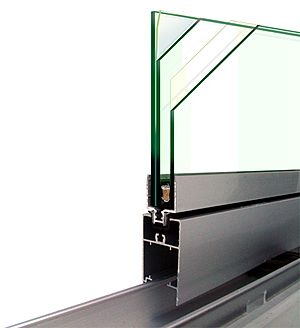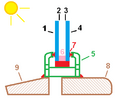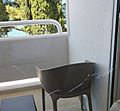Insulated glazing facts for kids
An Insulated Glazing Unit (often called an IGU) is a special type of window glass. It's made from two or more sheets of glass, called "lites," with a gap of air or gas in between them. A special piece called a "spacer" keeps the glass sheets apart at the edges. The whole unit is sealed tightly, like a sealed sandwich, so no air can get in or out of the gap.
This design makes IGUs much better at keeping heat in or out of a building compared to regular single-pane windows. They also help block out noise.
Most IGUs have two panes of glass and are known as "double glazing." But in very cold places, you might see "triple glazing" or even more panes to offer even better insulation. An IGU fits into a window frame just like a single thick piece of glass.
When we talk about "insulated glass," we're usually thinking about how well it stops heat from moving through it. Even though we say "insulated glass," it's actually the air or gas trapped between the glass panes that does the insulating work, not the glass itself. That's why some people prefer to say "insulating glass."
Contents
How Insulated Glazing Works
Insulated glazing units are designed to slow down heat transfer. Heat naturally tries to move from warmer places to colder places. In winter, heat from inside your warm house tries to escape through windows to the cold outside. In summer, heat from the hot outside tries to get into your cool house.
The Air Gap
The secret to an IGU's performance is the sealed space between the glass panes. This space is usually filled with air or a special gas like argon or krypton. Air and these gases are not good at conducting heat. This means they don't let heat pass through them easily.
Because the air or gas is trapped, it can't move around much. This stops heat from being carried away by moving air, which is called convection. So, the IGU acts like a barrier, keeping your home warmer in winter and cooler in summer.
Better Than Single Panes
Imagine a single pane of glass. Heat can easily pass through it, and cold air can quickly cool down the inside surface. This is why single-pane windows often feel cold to the touch in winter and can even get condensation (water droplets) on them.
With an IGU, the inner pane stays warmer in winter because of the insulating gap. This makes your home more comfortable and helps you save energy because your heating or cooling system doesn't have to work as hard.
Types of Insulated Glazing Units
IGUs come in different types, depending on how many glass panes they have and what's in the gap.
Double Glazing
This is the most common type of IGU. It has two panes of glass separated by a sealed air or gas gap. Double glazing is a big improvement over single-pane windows for energy efficiency and noise reduction.
Triple Glazing
Triple glazing has three panes of glass with two sealed gaps. This provides even better insulation than double glazing. It's often used in very cold climates or in buildings where energy efficiency is extremely important.
Special Gases and Coatings
Sometimes, the space between the glass panes is filled with special gases like argon or krypton instead of just air. These gases are heavier and even better insulators than air.
Some IGUs also have special coatings on the glass. These "low-emissivity" (low-E) coatings are very thin and transparent. They help reflect heat, keeping it inside during winter and outside during summer.
Benefits of Insulated Glazing
Using IGUs in buildings has many advantages:
- Energy Saving: They reduce the amount of heat that escapes or enters your home. This means you use less energy for heating and cooling, which can save you money on your energy bills.
- Comfort: Rooms with IGUs feel more comfortable because there are fewer cold spots near windows in winter.
- Noise Reduction: The multiple layers of glass and the air gap help to block out outside noise, making your home quieter.
- Reduced Condensation: Because the inside surface of the glass stays warmer, IGUs are less likely to get condensation, which can lead to mold growth.
Images for kids
-
A diagram showing the parts of an insulated glass unit (IGU). Surface #1 is the outside, #2 is the inside of the outer pane, #3 is the outside of the inner pane, and #4 is the inside of the inner pane. The window frame is #5, the spacer is #6, seals are #7, the inside trim is #8, and the outside windowsill is #9.
See also
 In Spanish: Unidad de vidrio aislante para niños
In Spanish: Unidad de vidrio aislante para niños
 | May Edward Chinn |
 | Rebecca Cole |
 | Alexa Canady |
 | Dorothy Lavinia Brown |












